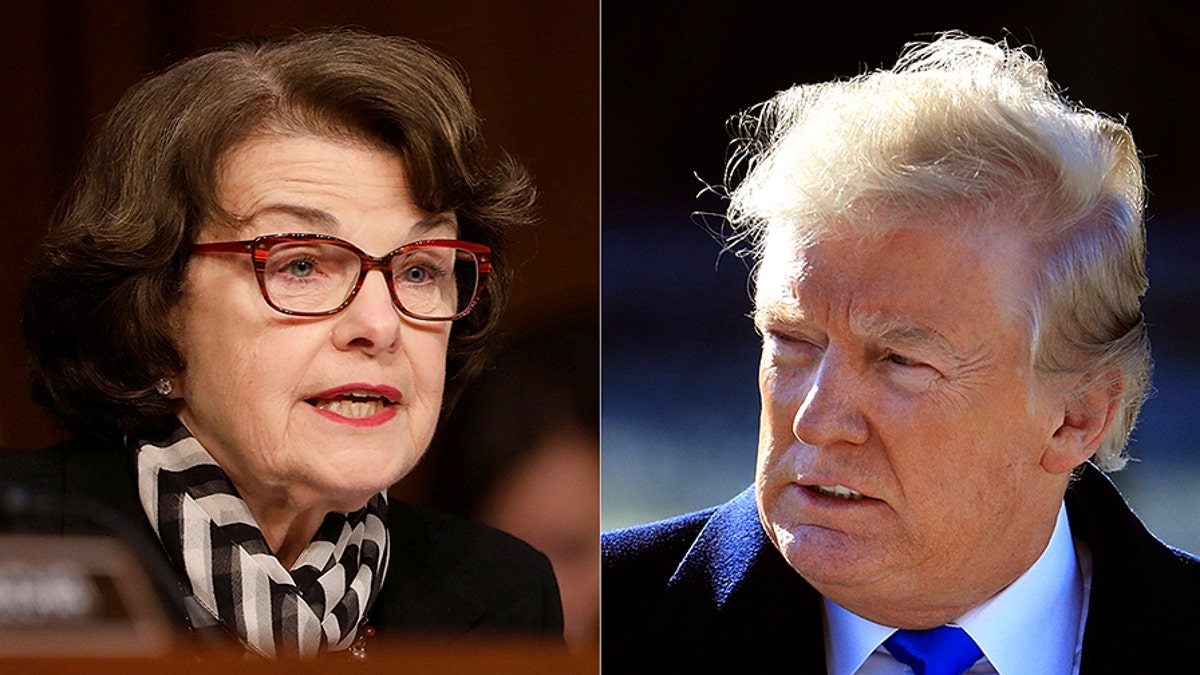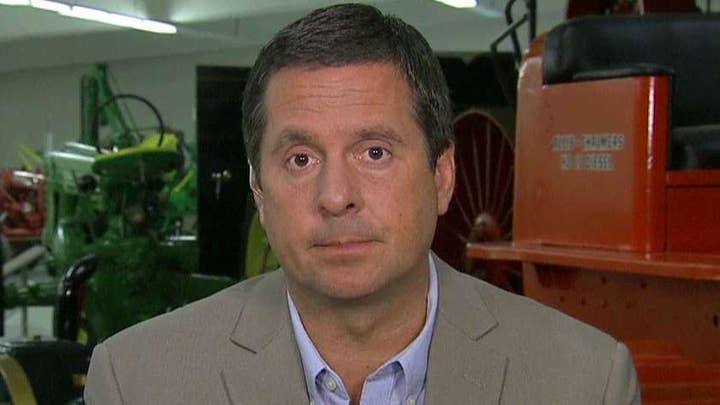
President Trump has a new nickname for Sen. Dianne Feinstein.
Revelations that Sen. Dianne Feinstein's former driver and aide was probed by the FBI for allegedly acting as a Chinese spy have spurred claims of a double standard concerning how the bureau handled suspicions of Russian coordination with the Trump campaign.
The California Democrat, in a statement last week, said the FBI informed her of its concerns regarding the staffer in her San Francisco office five years ago. Feinstein said she then ousted the staffer “immediately.”
But this has renewed questions among President Trump's allies about the bureau's approach in 2016 to suspicions regarding his campaign aides' potential Russian ties. In one case, the FBI briefed Feinstein; in the other, the bureau proceeded to use an informant and surveillance warrants to get information on Trump campaign figures.
House Intelligence Committee Chairman Devin Nunes, R-Calif., who has been a staunch Trump defender throughout the federal probe into Russian meddling and potential collusion with his campaign, complained that Feinstein and Trump were handled differently.
“Providing a defensive briefing, like the one given to Senator Feinstein, is a typical response to these kinds of situations,” Nunes said in a statement to Fox News. “The refusal to give the Trump campaign a defensive briefing, and instead opening a sprawling counter-intelligence investigation of American citizens, is one of many alarming ways that intelligence leaders drastically diverged from normal procedures in their Trump campaign investigation.”
The FBI reportedly informed Feinstein, then-chairwoman of the Senate Intelligence Committee, about the spy allegations. The suspected spy served as Feinstein’s driver in California, but also took on additional responsibilities in the office, such as working as a liaison to the Asian-American community in California.
The staffer reportedly attended Chinese consulate events on behalf of the senator, and reportedly was recruited after being befriended by someone from China’s Ministry of State Security.
“Five years ago the FBI informed me it had concerns that an administrative member of my California staff was potentially being sought out by the Chinese government to provide information,” Feinstein said in a statement. “He was not a mole or a spy, but someone who a foreign intelligence service thought it could recruit.”
Feinstein said the FBI “reviewed the matter” and “shared its concerns” with her. The staffer was removed.
“He never had access to classified or sensitive information or legislative matters,” Feinstein said. “The FBI never informed me of any compromise of national security information.”
The Wall Street Journal editorial board wrote this week that the issue is “what the FBI told Mrs. Feinstein but didn’t tell Mr. Trump.”
“The question Mr. Trump should ask is why the bureau didn’t treat him as a potential President with the same customary courtesy,” the editorial said. “The FBI claims it had concerns beginning in spring 2016 that low-level Trump campaign staffers Carter Page and George Papadopoulos were colluding with Russians. Yet rather than give the Trump campaign the usual defensive briefing, the FBI launched an unprecedented counterintelligence investigation into a president’s campaign, running informants against it and obtaining surveillance warrants.”
The FBI declined to comment on why Trump was not given the same kind of briefing as Feinstein when the investigation began and when Foreign Intelligence Surveillance Act warrants were obtained against Page.
But retired FBI special agent and former national spokesman John Iannarelli, who worked at the FBI at the time of the investigation into the Feinstein staffer but not specifically on the case, explained that the difference in bureau procedure could have been based on the narrow scope of the case.
“The Feinstein investigation was very narrow, in terms of who their target was, whereas the Trump investigation appears to be much broader,” Ianarelli told Fox News, listing Page, Papadopoulos, former Trump campaign chairman Paul Manafort and former campaign staffer Rick Gates.
He also suggested the FBI trusted Feinstein with the information. “When you’re conducting a public corruption investigation, if you’re looking at someone who's working for the official but have nothing to indicate that the official is involved, you may notify the official to prevent the investigation from being compromised,” Iannarelli said.
Over the weekend, Trump blasted Feinstein for having a “Chinese spy” in her office for “20 years.”
“The leader of the Russia investigation, Dianne Feinstein, had a Chinese spy as her driver for 20 years,” Trump said during a rally in Ohio. “And she’s leading the Russian witch hunt. Isn’t that something? And then she says to me, ‘What did you know about this and that?’ Give me a break.”
It is unclear what Trump meant when referring to Feinstein as “the leader” of the Russia probe, but the Senate Judiciary Committee, where Feinstein serves as ranking member, is running its own investigation into Russian collusion.
The president also blasted Feinstein on Twitter last week, questioning whether the senator would “investigate herself.”
Feinstein fired back.
“The FBI told me 5 years ago it had concerns that China was seeking to recruit an administrative member of my Calif staff (despite no access to sensitive information),” Feinstein tweeted. “I took those concerns seriously, learned the facts and made sure the employee left my office immediately.”
She added: “Compare that to your actions: attacking the FBI and refusing the advice of your national security team. SAD! I appreciated then and now the diligent work of our law enforcement and intelligence agencies and acted in the best interests of the country. Give it a try!”
Fox News' Chad Pergram and Lukas Mikelionis contributed to this report.





